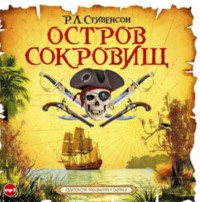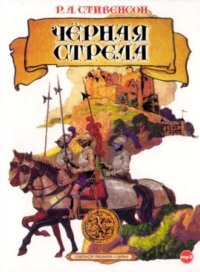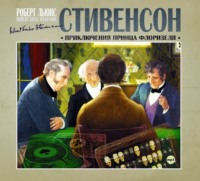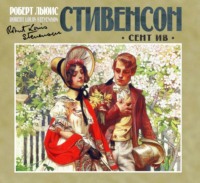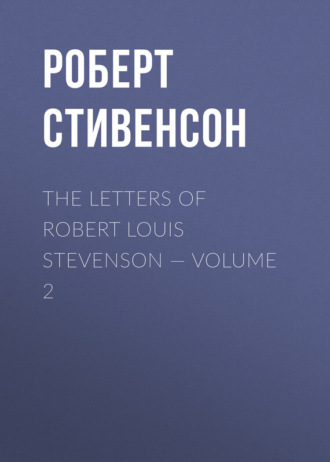 полная версия
полная версияThe Letters of Robert Louis Stevenson — Volume 2
I was the more interested in your LIFE of your father, because I meditate one of mine, or rather of my family. I have no such materials as you, and (our objections already made) your attack fills me with despair; it is direct and elegant, and your style is always admirable to me — lenity, lucidity, usually a high strain of breeding, an elegance that has a pleasant air of the accidental. But beware of purple passages. I wonder if you think as well of your purple passages as I do of mine? I wonder if you think as ill of mine as I do of yours? I wonder; I can tell you at least what is wrong with yours — they are treated in the spirit of verse. The spirit — I don't mean the measure, I don't mean you fall into bastard cadences; what I mean is that they seem vacant and smoothed out, ironed, if you like. And in a style which (like yours) aims more and more successfully at the academic, one purple word is already much; three — a whole phrase — is inadmissible. Wed yourself to a clean austerity: that is your force. Wear a linen ephod, splendidly candid. Arrange its folds, but do not fasten it with any brooch. I swear to you, in your talking robes, there should be no patch of adornment; and where the subject forces, let it force you no further than it must; and be ready with a twinkle of your pleasantry. Yours is a fine tool, and I see so well how to hold it; I wonder if you see how to hold mine? But then I am to the neck in prose, and just now in the 'dark INTERSTYLAR cave,' all methods and effects wooing me, myself in the midst impotent to follow any. I look for dawn presently, and a full flowing river of expression, running whither it wills. But these useless seasons, above all, when a man MUST continue to spoil paper, are infinitely weary.
We are in our house after a fashion; without furniture, 'tis true, camping there, like the family after a sale. But the bailiff has not yet appeared; he will probably come after. The place is beautiful beyond dreams; some fifty miles of the Pacific spread in front; deep woods all round; a mountain making in the sky a profile of huge trees upon our left; about us, the little island of our clearing, studded with brave old gentlemen (or ladies, or 'the twa o' them') whom we have spared. It is a good place to be in; night and morning, we have Theodore Rousseaus (always a new one) hung to amuse us on the walls of the world; and the moon — this is our good season, we have a moon just now — makes the night a piece of heaven. It amazes me how people can live on in the dirty north; yet if you saw our rainy season (which is really a caulker for wind, wet, and darkness — howling showers, roaring winds, pit- blackness at noon) you might marvel how we could endure that. And we can't. But there's a winter everywhere; only ours is in the summer. Mark my words: there will be a winter in heaven — and in hell. CELA RENTRE DANS LES PROCEDES DU BON DIEU; ET VOUS VERREZ! There's another very good thing about Vailima, I am away from the little bubble of the literary life. It is not all beer and skittles, is it? By the by, my BALLADS seem to have been dam bad; all the crickets sing so in their crickety papers; and I have no ghost of an idea on the point myself: verse is always to me the unknowable. You might tell me how it strikes a professional bard: not that it really matters, for, of course, good or bad, I don't think I shall get into THAT galley any more. But I should like to know if you join the shrill chorus of the crickets. The crickets are the devil in all to you: 'tis a strange thing, they seem to rejoice like a strong man in their injustice. I trust you got my letter about your Browning book. In case it missed, I wish to say again that your publication of Browning's kind letter, as an illustration of HIS character, was modest, proper, and in radiant good taste. — In Witness whereof, etc., etc.,
ROBERT LOUIS STEVENSON.Letter: TO MISS RAWLINSON
VAILIMA, APIA, SAMOA, APRIL 1891MY DEAR MAY, — I never think of you by any more ceremonial name, so I will not pretend. There is not much chance that I shall forget you until the time comes for me to forget all this little turmoil in a corner (though indeed I have been in several corners) of an inconsiderable planet. You remain in my mind for a good reason, having given me (in so short a time) the most delightful pleasure. I shall remember, and you must still be beautiful. The truth is, you must grow more so, or you will soon be less. It is not so easy to be a flower, even when you bear a flower's name. And if I admired you so much, and still remember you, it is not because of your face, but because you were then worthy of it, as you must still continue.
Will you give my heartiest congratulations to Mr. S.? He has my admiration; he is a brave man; when I was young, I should have run away from the sight of you, pierced with the sense of my unfitness. He is more wise and manly. What a good husband he will have to be! And you — what a good wife! Carry your love tenderly. I will never forgive him — or you — it is in both your hands — if the face that once gladdened my heart should be changed into one sour or sorrowful.
What a person you are to give flowers! It was so I first heard of you; and now you are giving the May flower!
Yes, Skerryvore has passed; it was, for us. But I wish you could see us in our new home on the mountain, in the middle of great woods, and looking far out over the Pacific. When Mr. S. is very rich, he must bring you round the world and let you see it, and see the old gentleman and the old lady. I mean to live quite a long while yet, and my wife must do the same, or else I couldn't manage it; so, you see, you will have plenty of time; and it's a pity not to see the most beautiful places, and the most beautiful people moving there, and the real stars and moon overhead, instead of the tin imitations that preside over London. I do not think my wife very well; but I am in hopes she will now have a little rest. It has been a hard business, above all for her; we lived four months in the hurricane season in a miserable house, overborne with work, ill-fed, continually worried, drowned in perpetual rain, beaten upon by wind, so that we must sit in the dark in the evenings; and then I ran away, and she had a month of it alone. Things go better now; the back of the work is broken; and we are still foolish enough to look forward to a little peace. I am a very different person from the prisoner of Skerryvore. The other day I was three- and-twenty hours in an open boat; it made me pretty ill; but fancy its not killing me half-way! It is like a fairy story that I should have recovered liberty and strength, and should go round again among my fellow-men, boating, riding, bathing, toiling hard with a wood-knife in the forest. I can wish you nothing more delightful than my fortune in life; I wish it you; and better, if the thing be possible.
Lloyd is tinkling below me on the typewriter; my wife has just left the room; she asks me to say she would have written had she been well enough, and hopes to do it still. — Accept the best wishes of your admirer,
ROBERT LOUIS STEVENSON.Letter: TO MISS ADELAIDE BOODLE
[VAILIMA, MAY 1891.]MY DEAR ADELAIDE, — I will own you just did manage to tread on my gouty toe; and I beg to assure you with most people I should simply have turned away and said no more. My cudgelling was therefore in the nature of a caress or testimonial.
God forbid, I should seem to judge for you on such a point; it was what you seemed to set forth as your reasons that fluttered my old Presbyterian spirit — for, mind you, I am a child of the Covenanters — whom I do not love, but they are mine after all, my father's and my mother's — and they had their merits too, and their ugly beauties, and grotesque heroisms, that I love them for, the while I laugh at them; but in their name and mine do what you think right, and let the world fall. That is the privilege and the duty of private persons; and I shall think the more of you at the greater distance, because you keep a promise to your fellow-man, your helper and creditor in life, by just so much as I was tempted to think the less of you (O not much, or I would never have been angry) when I thought you were the swallower of a (tinfoil) formula.
I must say I was uneasy about my letter, not because it was too strong as an expression of my unregenerate sentiments, but because I knew full well it should be followed by something kinder. And the mischief has been in my health. I fell sharply sick in Sydney, was put aboard the LUBECK pretty bad, got to Vailima, hung on a month there, and didn't pick up as well as my work needed; set off on a journey, gained a great deal, lost it again; and am back at Vailima, still no good at my necessary work. I tell you this for my imperfect excuse that I should not have written you again sooner to remove the bad taste of my last.
A road has been called Adelaide Road; it leads from the back of our house to the bridge, and thence to the garden, and by a bifurcation to the pig pen. It is thus much traversed, particularly by Fanny. An oleander, the only one of your seeds that prospered in this climate, grows there; and the name is now some week or ten days applied and published. ADELAIDE ROAD leads also into the bush, to the banana patch, and by a second bifurcation over the left branch of the stream to the plateau and the right hand of the gorges. In short, it leads to all sorts of good, and is, besides, in itself a pretty winding path, bound downhill among big woods to the margin of the stream.
What a strange idea, to think me a Jew-hater! Isaiah and David and Heine are good enough for me; and I leave more unsaid. Were I of Jew blood, I do not think I could ever forgive the Christians; the ghettos would get in my nostrils like mustard or lit gunpowder. Just so you as being a child of the Presbytery, I retain — I need not dwell on that. The ascendant hand is what I feel most strongly; I am bound in and in with my forbears; were he one of mine, I should not be struck at all by Mr. Moss of Bevis Marks, I should still see behind him Moses of the Mount and the Tables and the shining face. We are all nobly born; fortunate those who know it; blessed those who remember.
I am, my dear Adelaide, most genuinely yours,
ROBERT LOUIS STEVENSON.Write by return to say you are better, and I will try to do the same.
Letter: TO CHARLES BAXTER
[VAILIMA], TUESDAY, 19TH MAY '91MY DEAR CHARLES, — I don't know what you think of me, not having written to you at all during your illness. I find two sheets begun with your name, but that is no excuse... I am keeping bravely; getting about better, every day, and hope soon to be in my usual fettle. My books begin to come; and I fell once more on the Old Bailey session papers. I have 1778, 1784, and 1786. Should you be able to lay hands on any other volumes, above all a little later, I should be very glad you should buy them for me. I particularly want ONE or TWO during the course of the Peninsular War. Come to think, I ought rather to have communicated this want to Bain. Would it bore you to communicate to that effect with the great man? The sooner I have them, the better for me. 'Tis for Henry Shovel. But Henry Shovel has now turned into a work called 'The Shovels of Newton French: Including Memoirs of Henry Shovel, a Private in the Peninsular War,' which work is to begin in 1664 with the marriage of Skipper, afterwards Alderman Shovel of Bristol, Henry's great- great-grandfather, and end about 1832 with his own second marriage to the daughter of his runaway aunt. Will the public ever stand such an opus? Gude kens, but it tickles me. Two or three historical personages will just appear: Judge Jeffreys, Wellington, Colquhoun, Grant, and I think Townsend the runner. I know the public won't like it; let 'em lump it then; I mean to make it good; it will be more like a saga. — Adieu, yours ever affectionately,
R. L. STEVENSON.Letter: TO E. L. BURLINGAME
VAILIMA [SUMMER 1891]MY DEAR BURLINGAME, — I find among my grandfather's papers his own reminiscences of his voyage round the north with Sir Walter, eighty years ago, LABUNTUR ANNI! They are not remarkably good, but he was not a bad observer, and several touches seem to me speaking. It has occurred to me you might like them to appear in the MAGAZINE. If you would, kindly let me know, and tell me how you would like it handled. My grandad's MS. runs to between six and seven thousand words, which I could abbreviate of anecdotes that scarce touch Sir W. Would you like this done? Would you like me to introduce the old gentleman? I had something of the sort in my mind, and could fill a few columns rather A PROPOS. I give you the first offer of this, according to your request; for though it may forestall one of the interests of my biography, the thing seems to me particularly suited for prior appearance in a magazine.
I see the first number of the WRECKER; I thought it went lively enough; and by a singular accident, the picture is not unlike Tai- o-hae!
Thus we see the age of miracles, etc. — Yours very sincerely,
R. L. S.Proofs for next mail.
Letter: TO W. CRAIBE ANGUS
[SUMMER 1891.]DEAR MR. ANGUS, — You can use my letter as you will. The parcel has not come; pray Heaven the next post bring it safe. Is it possible for me to write a preface here? I will try if you like, if you think I must: though surely there are Rivers in Assyria. Of course you will send me sheets of the catalogue; I suppose it (the preface) need not be long; perhaps it should be rather very short? Be sure you give me your views upon these points. Also tell me what names to mention among those of your helpers, and do remember to register everything, else it is not safe.
The true place (in my view) for a monument to Fergusson were the churchyard of Haddington. But as that would perhaps not carry many votes, I should say one of the two following sites: — First, either as near the site of the old Bedlam as we could get, or, second, beside the Cross, the heart of his city. Upon this I would have a fluttering butterfly, and, I suggest, the citation,
Poor butterfly, thy case I mourn.
For the case of Fergusson is not one to pretend about. A more miserable tragedy the sun never shone upon, or (in consideration of our climate) I should rather say refused to brighten. — Yours truly,
ROBERT LOUIS STEVENSON.Where Burns goes will not matter. He is no local poet, like your Robin the First; he is general as the casing air. Glasgow, as the chief city of Scottish men, would do well; but for God's sake, don't let it be like the Glasgow memorial to Knox: I remember, when I first saw this, laughing for an hour by Shrewsbury clock.
R. L. S.Letter: TO H. C. IDE
[VAILIMA, JUNE 19, 1891.]DEAR MR. IDE, — Herewith please find the DOCUMENT, which I trust will prove sufficient in law. It seems to me very attractive in its eclecticism; Scots, English, and Roman law phrases are all indifferently introduced, and a quotation from the works of Haynes Bayly can hardly fail to attract the indulgence of the Bench. — Yours very truly,
ROBERT LOUIS STEVENSON.I, Robert Louis Stevenson, Advocate of the Scots Bar, author of THE MASTER OF BALLANTRAE and MORAL EMBLEMS, stuck civil engineer, sole owner and patentee of the Palace and Plantation known as Vailima in the island of Upolu, Samoa, a British Subject, being in sound mind, and pretty well, I thank you, in body:
In consideration that Miss Annie H. Ide, daughter of H. C. Ide, in the town of Saint Johnsbury, in the county of Caledonia, in the state of Vermont, United States of America, was born, out of all reason, upon Christmas Day, and is therefore out of all justice denied the consolation and profit of a proper birthday;
And considering that I, the said Robert Louis Stevenson, have attained an age when O, we never mention it, and that I have now no further use for a birthday of any description;
And in consideration that I have met H. C. Ide, the father of the said Annie H. Ide, and found him about as white a land commissioner as I require:
HAVE TRANSFERRED, and DO HEREBY TRANSFER, to the said Annie H. Ide, ALL AND WHOLE my rights and priviledges in the thirteenth day of November, formerly my birthday, now, hereby, and henceforth, the birthday of the said Annie H. Ide, to have, hold, exercise, and enjoy the same in the customary manner, by the sporting of fine raiment, eating of rich meats, and receipt of gifts, compliments, and copies of verse, according to the manner of our ancestors;
AND I DIRECT the said Annie H. Ide to add to the said name of Annie H. Ide the name Louisa — at least in private; and I charge her to use my said birthday with moderation and humanity, ET TAMQUAM BONA FILIA FAMILIAE, the said birthday not being so young as it once was, and having carried me in a very satisfactory manner since I can remember;
And in case the said Annie H. Ide shall neglect or contravene either of the above conditions, I hereby revoke the donation and transfer my rights in the said birthday to the President of the United States of America for the time being:
In witness whereof I have hereto set my hand and seal this nineteenth day of June in the year of grace eighteen hundred and ninety-one.
[SEAL.] ROBERT LOUIS STEVENSON. WITNESS, LLOYD OSBOURNE, WITNESS, HAROLD WATTS.Letter: TO HENRY JAMES
[VAILIMA, OCTOBER 1891.]MY DEAR HENRY JAMES, — From this perturbed and hunted being expect but a line, and that line shall be but a whoop for Adela. O she's delicious, delicious; I could live and die with Adela — die, rather the better of the two; you never did a straighter thing, and never will.
DAVID BALFOUR, second part of KIDNAPPED, is on the stocks at last; and is not bad, I think. As for THE WRECKER, it's a machine, you know — don't expect aught else — a machine, and a police machine; but I believe the end is one of the most genuine butcheries in literature; and we point to our machine with a modest pride, as the only police machine without a villain. Our criminals are a most pleasing crew, and leave the dock with scarce a stain upon their character.
What a different line of country to be trying to draw Adela, and trying to write the last four chapters of THE WRECKER! Heavens, it's like two centuries; and ours is such rude, transpontine business, aiming only at a certain fervour of conviction and sense of energy and violence in the men; and yours is so neat and bright and of so exquisite a surface! Seems dreadful to send such a book to such an author; but your name is on the list. And we do modestly ask you to consider the chapters on the NORAH CREINA with the study of Captain Nares, and the forementioned last four, with their brutality of substance and the curious (and perhaps unsound) technical manoeuvre of running the story together to a point as we go along, the narrative becoming more succinct and the details fining off with every page. — Sworn affidavit of
R. L. S.NO PERSON NOW ALIVE HAS BEATEN ADELA: I ADORE ADELA AND HER MAKER. SIC SUBSCRIB.
ROBERT LOUIS STEVENSON. A Sublime Poem to follow Adela, Adela, Adela Chart, What have you done to my elderly heart? Of all the ladies of paper and ink I count you the paragon, call you the pink. The word of your brother depicts you in part: 'You raving maniac!' Adela Chart; But in all the asylums that cumber the ground, So delightful a maniac was ne'er to be found. I pore on you, dote on you, clasp you to heart, I laud, love, and laugh at you, Adela Chart, And thank my dear maker the while I admire That I can be neither your husband nor sire. Your husband's, your sire's were a difficult part; You're a byway to suicide, Adela Chart; But to read of, depicted by exquisite James, O, sure you're the flower and quintessence of dames. R. L. S. ERUCTAVIT COR MEUMMy heart was inditing a goodly matter about Adela Chart.
Though oft I've been touched by the volatile dart,
To none have I grovelled but Adela Chart,
There are passable ladies, no question, in art -
But where is the marrow of Adela Chart?
I dreamed that to Tyburn I passed in the cart -
I dreamed I was married to Adela Chart:
From the first I awoke with a palpable start,
The second dumfoundered me, Adela Chart!
Another verse bursts from me, you see; no end to the violence of the Muse.
Letter: TO E. L. BURLINGAME
OCTOBER 8TH, 1891MY DEAR BURLINGAME, — All right, you shall have the TALES OF MY GRANDFATHER soon, but I guess we'll try and finish off THE WRECKER first. A PROPOS of whom, please send some advanced sheets to Cassell's — away ahead of you — so that they may get a dummy out.
Do you wish to illustrate MY GRANDFATHER? He mentions as excellent a portrait of Scott by Basil Hall's brother. I don't think I ever saw this engraved; would it not, if you could get track of it, prove a taking embellishment? I suggest this for your consideration and inquiry. A new portrait of Scott strikes me as good. There is a hard, tough, constipated old portrait of my grandfather hanging in my aunt's house, Mrs. Alan Stevenson, 16 St. Leonard's Terrace, Chelsea, which has never been engraved — the better portrait, Joseph's bust has been reproduced, I believe, twice — and which, I am sure, my aunt would let you have a copy of. The plate could be of use for the book when we get so far, and thus to place it in the MAGAZINE might be an actual saving.
I am swallowed up in politics for the first, I hope for the last, time in my sublunary career. It is a painful, thankless trade; but one thing that came up I could not pass in silence. Much drafting, addressing, deputationising has eaten up all my time, and again (to my contrition) I leave you Wreckerless. As soon as the mail leaves I tackle it straight. — Yours very sincerely,
ROBERT LOUIS STEVENSON.Letter: TO E. L. BURLINGAME
VAILIMA [AUTUMN 1891]MY DEAR BURLINGAME, — The time draws nigh, the mail is near due, and I snatch a moment of collapse so that you may have at least some sort of a scratch of note along with the
\ end
\ of
\ THE
\ WRECKER.
Hurray!
which I mean to go herewith. It has taken me a devil of a pull, but I think it's going to be ready. If I did not know you were on the stretch waiting for it and trembling for your illustrations, I would keep it for another finish; but things being as they are, I will let it go the best way I can get it. I am now within two pages of the end of Chapter XXV., which is the last chapter, the end with its gathering up of loose threads, being the dedication to Low, and addressed to him: this is my last and best expedient for the knotting up of these loose cards. 'Tis possible I may not get that finished in time, in which case you'll receive only Chapters XXII. to XXV. by this mail, which is all that can be required for illustration.
I wish you would send me MEMOIRS OF BARON MARBOT (French); INTRODUCTION TO THE STUDY OF THE HISTORY OF LANGUAGE, Strong, Logeman & Wheeler; PRINCIPLES OF PSYCHOLOGY, William James; Morris & Magnusson's SAGA LIBRARY, any volumes that are out; George Meredith's ONE OF OUR CONQUERORS; LA BAS, by Huysmans (French); O'Connor Morris's GREAT COMMANDERS OF MODERN TIMES; LIFE'S HANDICAP, by Kipling; of Taine's ORIGINES DE LA FRANCE CONTEMPORAINE, I have only as far as LA REVOLUTION, vol. iii.; if another volume is out, please add that. There is for a book-box.
I hope you will like the end; I think it is rather strong meat. I have got into such a deliberate, dilatory, expansive turn, that the effort to compress this last yarn was unwelcome; but the longest yarn has to come to an end sometime. Please look it over for carelessnesses, and tell me if it had any effect upon your jaded editorial mind. I'll see if ever I have time to add more.


